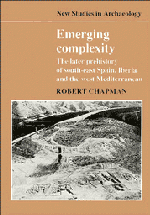Book contents
- Frontmatter
- Contents
- List of figures
- List of tables
- Preface
- 1 Two tribes: questions of theory, scale and explanation
- 2 Hello, goodbye: Iberian prehistory and traditional archaeology
- 3 Another one bites the dust: the implications of the absolute chronology
- 4 Getting better: south-east Spain, the cultural framework 5000–500 bc
- 5 Dancin' in the dark? Adaptation and intensification in south–east Spain
- 6 Centrefield: recent models of intensification and cultural change in south-east Spain
- 7 Into the groove: system scale and technological innovation in south-east Spain
- 8 Out of reach? Complexity, interaction and integration in south-east Spain
- 9 Eliminator: models and the archaeological record in south-east Spain
- 10 Strong persuader: intensification and interaction in Iberia and the west Mediterranean
- 11 With or without you: variability, evaluation and complexity
- Bibliography
- Index
1 - Two tribes: questions of theory, scale and explanation
Published online by Cambridge University Press: 05 March 2012
- Frontmatter
- Contents
- List of figures
- List of tables
- Preface
- 1 Two tribes: questions of theory, scale and explanation
- 2 Hello, goodbye: Iberian prehistory and traditional archaeology
- 3 Another one bites the dust: the implications of the absolute chronology
- 4 Getting better: south-east Spain, the cultural framework 5000–500 bc
- 5 Dancin' in the dark? Adaptation and intensification in south–east Spain
- 6 Centrefield: recent models of intensification and cultural change in south-east Spain
- 7 Into the groove: system scale and technological innovation in south-east Spain
- 8 Out of reach? Complexity, interaction and integration in south-east Spain
- 9 Eliminator: models and the archaeological record in south-east Spain
- 10 Strong persuader: intensification and interaction in Iberia and the west Mediterranean
- 11 With or without you: variability, evaluation and complexity
- Bibliography
- Index
Summary
This book has been written with three aims in mind. First, it is a detailed study of the later prehistory of south-east Spain, an area acknowledged since the 1880s as one of importance for our understanding of the emergence of cultural complexity in Europe to the north and west of the Aegean. Although the data on Copper and Bronze cultures in south-east Spain have been cited in a number of recent syntheses of European prehistory (e.g. Champion et al. 1984; Coles and Harding 1979; Whittle 1985; Barker 1985), there has been no major analysis of the data in their own right. Lull's impressive and detailed analysis of the Argaric Bronze Age in south-east Spain (1983) comes the nearest to a full synthesis, while Gilman and Thornes (1985) adopt a finer focus (on subsistence intensification) but over a longer time depth (from Neolithic to Later Bronze Age). In writing this book I am trying to combine the strengths of these two books, taking the entire later prehistoric sequence and presenting our current understanding of the archaeological record. As will become clear, there are contradictory opinions about this understanding, and there are many problems with the reliability of the archaeological data. I have tried to use these opinions and problems productively, suggesting areas for future research. Thus I regard this book as a way of clearing the decks, and signposting what I believe to be directions for research over the next decade.
- Type
- Chapter
- Information
- Emerging ComplexityThe Later Prehistory of South-East Spain, Iberia and the West Mediterranean, pp. 1 - 17Publisher: Cambridge University PressPrint publication year: 1990



